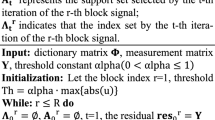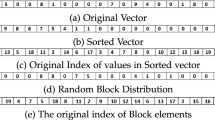Abstract
Within the compressive sensing framework, reconstruction algorithms of block-sparse signal (BSS) often have special requirements on sparsity patterns. As a result, only some particular BSSs can be reconstructed. In this paper, we present a new universal greedy iteration algorithm, named block-matching pursuit (BMP), for BSS with an arbitrary sparsity pattern. The BMP can reconstruct the target signal without prior information of the signal’s sparsity pattern and achieves an outstanding reconstruction probability. In each iteration, the BMP first estimates a part of support set of the signal by a correlation test. Based on the estimated support and the property of nonzero blocks, coordinates of all possible nonzero entries can be obtained to form a candidate list. Then some coordinates in the list, which are deemed sufficiently reliable by a final test, are added to the current estimated support set. When iteration ends, the true sparsity level, namely true support set, can be exactly calculated by searching a support set with the smallest cardinality; once the true set is derived, the target signal can be reconstructed. Theoretical analysis indicates that BMP can reconstruct the target signal as long as the sampling matrix meets a certain condition. Simulation results show that the reconstruction performance of BMP is better than that of other greedy algorithms. In particular, if the signal with high sparsity level contains a few blocks, BMP can still reconstruct it with a high probability.













Similar content being viewed by others
References
J.A. Bazerque, G.B. Giannakis, Distributed spectrum sensing for cognitive radio networks by exploiting sparsity. IEEE Trans. Signal Process. 58, 1847–1862 (2010)
E.J. Candès, J. Romberg, T. Tao, Robust uncertainty principles: exact signal reconstruction from highly incomplete frequency information. IEEE Trans. Inf. Theory 52, 489–509 (2006)
S.F. Cotter, B.D. Rao, K. Engan, K. Kreutz-Delgado, Sparse solutions to linear inverse problems with multiple measurement vectors. IEEE Trans. Signal Process. 53, 2477–2488 (2005)
W. Dai, O. Milenkovic, Subspace pursuit for compressive sensing signal reconstruction. IEEE Trans. Inf. Theory 55, 2230–2249 (2009)
M.A. Davenport, D. Needell, M.B. Wakin, Signal space CoSaMP for sparse recovery with redundant dictionaries. IEEE Trans. Inf. Theory 59, 6820–6829 (2013)
T.T. Do, G. Lu, N. Nguyen, T.D. Tran, Sparsity adaptive matching pursuit algorithm for practical compressed sensing, in Proceedings of Asilomar, Pacific Grove, CA, pp. 581–587 (2008)
D.L. Donoho, Y. Tsaig, I. Drori, J.L. Starck, Sparse solution of underdetermined linear equations by stagewise orthogonal matching pursuit. IEEE Trans. Inf. Theory 58, 1094–1121 (2012)
Y.C. Eldar, P. Kuppinger, H. Bolcskei, Block-sparse signals: uncertainty relations and efficient recovery. IEEE Trans. Signal Process. 58, 3042–3054 (2010)
J. Goodman, K. Forsythe, B. Miller, Efficient reconstruction of block-sparse signals, in Proceedings of 2011 IEEE SSP, Nice, France, pp. 629–632 (2011)
H. Guo, X. Li, L.K. Zhou, Z. Wu, Single-channel speech separation using dictionary-updated orthogonal matching pursuit and temporal structure information. Circuits Syst. Signal Process. 34, 3861–3882 (2015)
M. Mishali, Y.C. Eldar, Robust recovery of signals from a structured union of subspaces. IEEE Trans. Inf. Theory 55, 5302–5316 (2009)
M. Mishali, Y.C. Eldar, Reduce and boost: recovering arbitrary sets of jointly sparse vectors. IEEE Trans. Inf. Theory 56, 4692–4702 (2008)
D. Needell, R. Vershynin, Signal recovery from incomplete and inaccurate measurements via regularized orthogonal matching pursuit. IEEE J. Sel. Topics Signal Process. 4, 310–316 (2010)
D. Needell, J. Tropp, CoSaMP: iterative signal recovery from incomplete and inaccurate samples. Commun. ACM 53, 93–100 (2010)
M. Stojnic, F. Parvaresh, B. Hassibi, On the reconstruction of block-sparse signals with an optimal number of measurements. IEEE Trans. Signal Process. 57, 3075–3085 (2009)
M. Stojnic, \(l_2/l_1 \) optimization in block-sparse compressed sensing and Its strong thresholds. IEEE J. Sel. Topics Signal Process. 4, 350–357 (2010)
J. Tropp, A. Gilbert, M. Strauss, Algorithms for simultaneous sparse approximation. Part I: greedy pursuit. Signal Process. 86, 572–588 (2006)
J. Tropp, Algorithms for simultaneous sparse approximation. Part II: convex relaxation. Signal Process. 86, 589–602 (2006)
J. Tropp, A. Gilbert, Signal recovery from random measurements via orthogonal matching pursuit. IEEE Trans. Inf. Theory 53, 4655–4666 (2007)
T. Wimalajeewa, P.K. Varshney, OMP based joint sparsity pattern recovery under communication constraint. IEEE Trans. Signal Process. 62, 5059–5072 (2014)
H. Wu, S. Wang, Adaptive sparsity matching pursuit algorithm for sparse reconstruction. IEEE Signal Process. Lett. 19, 471–474 (2012)
E. Yang, X. Yan, K. Qin, A greedy pursuit algorithm for arbitrary block sparse signal recovery, in Proceedings of IEEE ISCAS 2016, Montreal, Canada, pp. 1234–1237 (2016)
F. Zeng, C. Li, Z. Tian, Distributed compressive spectrum sensing in cooperative multihop cognitive networks. IEEE J. Sel. Topics Signal Process. 5, 37–48 (2011)
X. Zhang, M. Li, J. Qu, H. Yang, Adaptive subspace detection of extended target in white Gaussian noise using sinc basis. Int. J. Electr. 103, 147–159 (2016)
Author information
Authors and Affiliations
Corresponding author
Additional information
This work was supported by the Fundamental Research Funds for the Central Universities of China under Grant ZYGX2015J121 and the National Natural Science Foundation of China under Grant No. 61601091.
Rights and permissions
About this article
Cite this article
Yang, E., Zhang, T., Yan, X. et al. Arbitrary Block-Sparse Signal Reconstruction Based on Incomplete Single Measurement Vector. Circuits Syst Signal Process 36, 4569–4592 (2017). https://doi.org/10.1007/s00034-017-0528-3
Received:
Revised:
Accepted:
Published:
Issue Date:
DOI: https://doi.org/10.1007/s00034-017-0528-3




